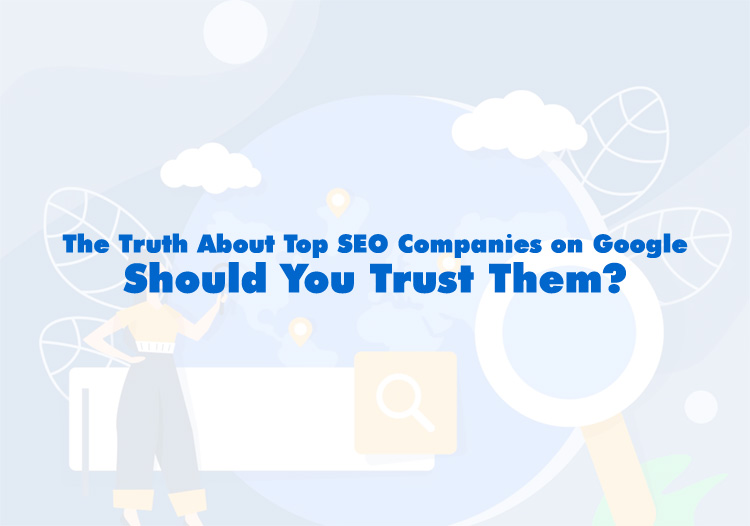Should You Trust the Top SEO Company Listings on Google?
- Where Do These “Top SEO Company” Lists Come From?
- a. Are They Created by Reputable Information Sources?
- b. Are These Lists Influenced by Paid Advertising?
- Pros and Cons of Referring to "Top SEO Company" Lists
- How to Spot a Trustworthy Top SEO List
- How to Choose a Reliable SEO Company (Beyond Top Lists)
- a. Review Their Past Projects
- b. Look for Clear Communication
- c. Avoid Over-the-Top Promises
- d. Read Reviews From Multiple Sources
- So, Should You Trust the “Top SEO Companies” Lists?
- Conclusion
Let’s take a closer look and break it all down in this comprehensive guide.
Where Do These “Top SEO Company” Lists Come From?
To answer the question “Should you trust the top SEO company lists on Google?”, we first need to understand where these lists originate and how they are created.
a. Are They Created by Reputable Information Sources?
Some lists are genuinely curated by news websites, marketing industry blogs, or service review platforms. These entities often compile information from multiple sources, drawing on user feedback, performance data, and real-world case studies.
However, many of today’s lists are cleverly disguised PR content or self-promotional blog posts written by the SEO companies themselves. They’re good at SEO, they write appealing content, and—unsurprisingly—they know how to push their own pages to the top of Google.
b. Are These Lists Influenced by Paid Advertising?
Yes. Many "Top SEO" lists are pay-to-play. Certain websites allow companies to pay a fee to be featured, sometimes even letting them choose their position on the list.
This turns the idea of “Top” into something more subjective—or worse, completely commercialized.
Pros and Cons of Referring to "Top SEO Company" Lists
When searching for the right partner to boost your online presence, many businesses turn to curated lists of “Top SEO Companies” on Google. While these rankings may offer a quick starting point, they don't always reflect the true quality or fit of a provider. At the same time, the growing demand for Vietnam SEO services has led to an increase in both genuine agencies and overly promotional listings. Understanding the benefits and limitations of these lists is essential if you want to make an informed decision.
Pros:
- Provides a starting point: If you’re new to SEO, these lists can help you build a shortlist of companies to explore further.
- Saves time: Instead of sorting through hundreds of search results, you’re handed a filtered list right away.
- Enables comparison: You can easily compare pricing, services, and customer feedback across several providers.
Cons:
- May lack objectivity: As mentioned earlier, many of these lists are promotional or influenced by payment. Objectivity is not guaranteed.
- Doesn’t reflect real-world performance: A company good at promoting itself isn’t necessarily good at delivering results for clients.
- Lacks real customer reviews: Many posts don’t include actual client testimonials or case studies, only flattering summaries.
How to Spot a Trustworthy Top SEO List
Not all lists are misleading. In fact, some can be genuinely helpful — if you know what to look for. According to insights from Viet SEO company, there are trustworthy sources that offer real value when evaluating SEO providers. Here are a few tips to help you separate credible rankings from paid placements:
a. Who Published the List?
Check the source of the article. If it’s a well-known tech blog, business magazine, or an independent review platform, it’s more likely to be reliable.
b. Are the Evaluation Criteria Clearly Explained?
A trustworthy list will clearly explain the criteria used to rank the companies—e.g., past results, customer reviews, years of experience, transparency in SEO practices, etc.
If a list just drops names without explanation, be skeptical.
c. Real User Reviews
Real feedback from clients—on Google Reviews, Facebook, LinkedIn, or trusted forums—will give you much more insight than polished marketing copy.
How to Choose a Reliable SEO Company (Beyond Top Lists)
Here’s how you can evaluate SEO agencies on your own—regardless of what the lists say. With the rise of Vietnam SEO services, it's more important than ever to look beyond rankings and focus on real indicators of credibility, such as case studies, client reviews, transparency, and long-term strategy. Taking a proactive approach ensures you partner with an agency that truly aligns with your goals.
a. Review Their Past Projects
A reputable SEO company should be willing to share case studies and detailed performance metrics.
Ask to see traffic growth, keyword rankings over time, conversion rate improvements, etc.
b. Look for Clear Communication
Do their consultants explain their SEO process clearly? Do they provide realistic KPIs and regular, transparent reporting?
If they only promise to “get you to the top in 30 days” without specifics—run.
c. Avoid Over-the-Top Promises
A professional SEO agency will never guarantee a #1 ranking in a short time. SEO is a long-term game that depends on many moving parts.
Empty promises like “top of Google in 1 month” are often red flags for shady tactics or black-hat SEO.
d. Read Reviews From Multiple Sources
Don’t just rely on testimonials on the company’s website. Google their name with keywords like “review,” “experience,” or “scam.” Also, check relevant Facebook groups or SEO communities.
So, Should You Trust the “Top SEO Companies” Lists?
While these lists can offer a helpful starting point, they’re not always objective or accurate. Some are influenced by paid placements rather than real performance or client satisfaction. According to VietSEO agency, the smartest approach is to use these lists as a reference—not a decision-maker—and always do your own research before choosing an SEO partner.
The short answer: Don’t trust them blindly, but use them as a reference point.
“Top SEO companies” lists can be helpful for getting started, but they should be a starting point—not the final decision. Here's what to do next:
- Check company credentials and history
- Review project results and past clients
- Understand their SEO strategy and timelines
- Compare multiple review sources
- Meet the team or request a discovery call
Conclusion
In today’s competitive digital world, SEO is a critical long-term investment. Choosing the right SEO partner directly impacts your online visibility and business success.
While “Top SEO company” lists on Google may help you narrow down your options, they often contain biased or promotional content. Vietnam SEO recommends not relying solely on these lists. Be proactive, do your research, and choose based on real performance—not just a headline.
Viet SEO encourages you to be a smart consumer in the digital age—one who values transparency, results, and long-term strategy.



